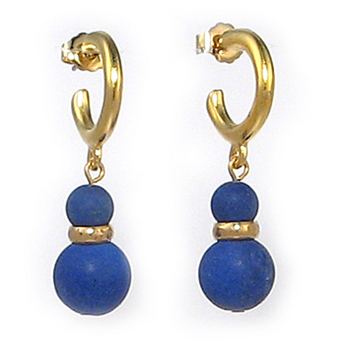

Gold & Lapis Hoop Earrings
Price: $45.00 Members: $40.50
Item: 10067180
Description
Gold & Lapis Hoop Earrings
The striking combination of bright, blue lapis lazuli and polished gold was as favored by the ancient Sumerians in Mesopotamia as it was by the Egyptians. They learned early on how to shape gold, silver, copper and bronze into useful objects. Necklaces, other jewelry, boxes and statues richly embellished with gold and lapis were found among the many treasures excavated at the royal cemetery at Ur.
Made of gold finished pewter, these splendid earrings are reflective of the spectacular costume and jewelry designs featured in the Met’s magnificent production of Aida.
- Gold-finished pewter
- Frosted lapis beads
- Pierced post back
- 1.5” L
- Gift box included
History
Aida
This grandest of grand operas, Giuseppe Verdi’s Aida features an epic backdrop for what is in essence an intimate love story set in ancient Egypt packed with magnificent choruses, dramatic arias, complex ensembles and elaborate ballets. The opera is, at its core, a profound exploration of the conflict of private emotion and public duty.
The score of this 4-act opera is a sophisticated example of Italian Romanticism as heard in the “Celeste Aida” right at the beginning of Act I, her impassioned “Ritorna vincitor!” that follows and her great internal journey, “Qui Radamès verrà! O patria mia” in Act III. At the center of Act II, is the great Triumphal Scene, which ranks among opera’s most celebrated moments.
Notable performances include a 1955 production conducted by Tullio Serafin with Maria Callas as Aida and Richard Tucker as Radamès, as well as a 1959 performance conducted by Herbert van Karajan with Renata Tebaldi as Aida and Carlo Bergonzi as Radamès.
Today the work holds a central place in the operatic canon, receiving performances every year around the world.
At the Metropolitan Opera alone, Aida has been performed more than 1,500 times since 1886 and was presented again in the Met’s 2018–19 season.
Aida was commissioned by and first performed at Cairo’s Khedivial Opera House on December 24, 1871.




 Write the first review
Write the first review
No reviews have been written for this product.
Be the first one! –
Write a Review
